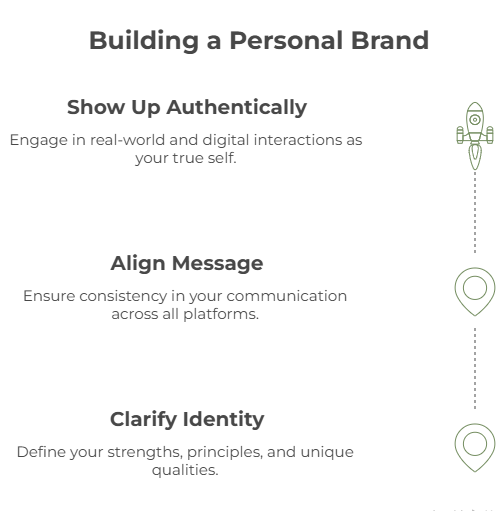Everyone has a reputation. The question is — are you shaping it, or letting others do it for you?
Personal branding is for anyone who wants to lead with intention, communicate their value clearly, and create opportunities that align with who they are — and who they’re becoming.
Whether you’re a CEO, senior manager, consultant, team leader, freelancer, or pivoting into a new role — your personal brand is important.
What Is personal branding — really?
At its core, personal branding is the intentional expression of your professional identity. It’s how you articulate what you bring to the table — not just in what you do, but how you do it, and why it matters.
Your personal brand is the sum of your reputation, values, communication style, and perceived value. It’s what people say about you when you’re not in the room — and what they remember after a single conversation or online profile visit.
Here’s the key distinction:
Your brand is not your persona.
It’s not about performance, polish, or pretending.
It’s about alignment — making sure how you show up matches who you are and what you stand for.
Digital visibility, career transitions, and competitive markets have raised the bar. If you don’t define your own brand, the world will do it for you.
That’s where intentional personal branding becomes a strategic advantage.
Who benefits from personal branding
Personal branding isn’t about being the loudest in the room. It’s about being the clearest.
Your ability to communicate who you are and what you bring is a professional advantage.
Here’s who benefits most:
1. Professionals aross industries
Whether you’re climbing the corporate ladder or building expertise within your niche, your personal brand is what sets you apart in a sea of qualified individuals:
- Freelancers and consultants: When your business depends on trust, your brand becomes your currency. The way you show up online and in conversation directly impacts whether a potential client believes you’re the right fit.
- Entrepreneurs and business owners: Customers don’t just buy products — they buy stories, values, and leadership. A strong personal brand builds credibility, attracts investors, and increases brand loyalty.
If this sounds like where you’re at, the Professional Identity Program is designed to help you sharpen how you show up.
2. Executive leaders
- Executives, Managers, and Team Leads: Leadership isn’t just about delivering results. It’s about setting the tone, building trust, and communicating with clarity. Your personal brand helps define how you’re perceived — not just inside your organization, but across your industry.
4. Career shifters and growth-minded professionals
If you’re evolving in your career — stepping into something new, or redefining your next chapter — personal branding becomes essential.
It helps you:
- Articulate your transferable skills.
- Reposition with intention.
- Build confidence as you pivot.
You don’t have to shout louder to be seen. You just have to get clearer.
Why personal branding matters more than ever
We live in a reputation-driven world. What people believe about you often shapes the opportunities you receive — long before you’ve had the chance to speak for yourself.
Here’s why intentional personal branding is no longer optional:
1. Differentiation in saturated markets
Everyone is qualified. Everyone has experience.
What makes you different isn’t your credentials — it’s how you show up and the story you tell.
Your personal brand is your unique value proposition. It’s what keeps you from blending in.
2. Credibility and trust-building
People trust what they understand.
A clear, consistent personal brand allows others to get you quickly — and trust what you bring to the table.
Whether it’s a hiring manager, a potential client, or a future collaborator, your brand becomes the signal that you’re reliable, intentional, and aligned.
3. Visibility and opportunities
You shouldn’t have to chase every opportunity. When your brand is strong, the right ones start coming to you.
From speaking invitations to job offers, partnerships, or press — personal branding expands your visibility and your perceived authority.
4. Control over your professional narrative
If you don’t define your brand, someone else will — and they may get it wrong.
Personal branding puts you in the driver’s seat. It lets you take ownership of your reputation, communicate your values, and stay ahead of perception.
Misconceptions to unlearn
Before you start shaping your personal brand, it helps to clear out the noise — especially the limiting beliefs.
“It’s just for extroverts or influencers.”
Personal branding isn’t about being everywhere — it’s about being intentional with how you show up.
Some of the most effective personal brands come from calm, grounded professionals who lead with thoughtfulness, not theatrics.
Presence doesn’t require performance. It requires clarity.
“Branding is fake or performative.”
When done right, personal branding isn’t about crafting a persona — it’s about refining the message around who you already are.
Authentic branding communicates your values, voice, and strengths — so people see you the way you want to be seen.
“I don’t need one if I’m not self-employed.”
Whether you’re an employee, executive, or in transition, you already have a brand — it’s just a question of whether it’s working for or against you.
In leadership roles, your personal brand impacts how you build trust, influence culture, and attract the right opportunities — internally and externally.
Your role may shift. But your reputation stays with you.
Examples: who’s doing it well
Here are a few standout examples of personal branding done right — across different industries and personalities:
1. Bozoma Saint John – The Bold Executive Brand
Who she is: Former CMO at Netflix, Uber, and Endeavor.
What stands out: Bozoma has built a brand around unapologetic presence. She shows up with power, style, and clarity — without ever diluting her identity to fit a traditional corporate mold.
Why it works: She blends executive authority with personal authenticity. Her voice is emotionally intelligent, culturally fluent, and instantly memorable. Her brand is her differentiator — and it’s helped her navigate industries, roles, and influence with ease.
Lesson: Presence + conviction = magnetic leadership.
2. Ali Abdaal – The Accessible Expert Brand
Who he is: Ex-doctor turned productivity content creator and entrepreneur.
What stands out: Ali’s personal brand is built on clarity, curiosity, and consistency. His tone is approachable, his expertise well-packaged, and his value proposition clear: helping ambitious professionals live better and work smarter.
Why it works: He’s not selling perfection — he’s sharing process. That relatability, paired with smart visual branding and strong content, makes him trusted and influential.
Lesson: Simplicity + consistency = long-term credibility.
3. Mel Robbins – The Human, No-BS Brand
Who she is: Author, coach, and speaker
What stands out: Mel’s brand is raw, real, and practical. She speaks directly to pain points with warmth and no-fluff advice — all rooted in personal experience and deep audience empathy.
Why it works: Her voice feels like a conversation, not a pitch. She balances vulnerability and authority, making her content feel personal and motivating — without being performative.
Lesson: Emotional clarity + narrative strength = deep trust and loyalty.
Each of these individuals didn’t “invent” something new.
They aligned their identity with their impact — and made it visible.
Want to create the same clarity for your brand?
Explore the Professional Identity Program
How to Get Started
Personal branding isn’t something you outsource. It’s a process you own — and when done right, it changes the way you lead, communicate, and make decisions.

Here’s where to start:
1. Clarify your identity and value.
What are your strengths, principles, and non-negotiables?
What makes you different — not just in skills, but in energy and approach?
2. Align your message and tone.
The way you speak, write, and present yourself should all reflect the same core identity.
Consistency builds trust. Alignment builds momentum.
3. Show up — online and offline.
A LinkedIn headline is a start. But real impact comes when you show up as yourself — in meetings, in strategy rooms, and in your own thinking.
The clearer your brand, the more confidently you move.
Ready to clarify how you show up and what you stand for?
Explore the Personal Branding page or dive straight into the Professional Identity Program
FAQ
1. Do I need personal branding if I’m not looking for a new job?
Yes. Personal branding isn’t just for job hunting — it’s how you shape your reputation, attract aligned opportunities, and lead with intention in your current role, business, or industry. It supports visibility, influence, and trust — wherever you are in your career.
2. Can introverts build a powerful personal brand?
Absolutely. Personal branding isn’t about being loud — it’s about being clear. Some of the strongest brands are built by quiet professionals who lead with substance, not noise. The key is alignment, not volume.
3. How early is too early to think about personal branding?
It’s never too early. Whether you’re launching a new career, exploring a pivot, or building long-term influence, your brand evolves with you. Starting early simply gives you more clarity — and control over your narrative.
4. Is personal branding only relevant for online presence?
Not at all. Your brand shows up in meetings, presentations, interviews, and everyday interactions — not just on LinkedIn. Online presence amplifies your identity, but it starts with how you think, speak, and show up offline.
5. What if I don’t know what my “brand” is yet?
That’s exactly where the work starts. Most people don’t — until they take the time to clarify it. That’s why we created the Professional Identity Program — to help you define your voice, value, and positioning with confidence.




